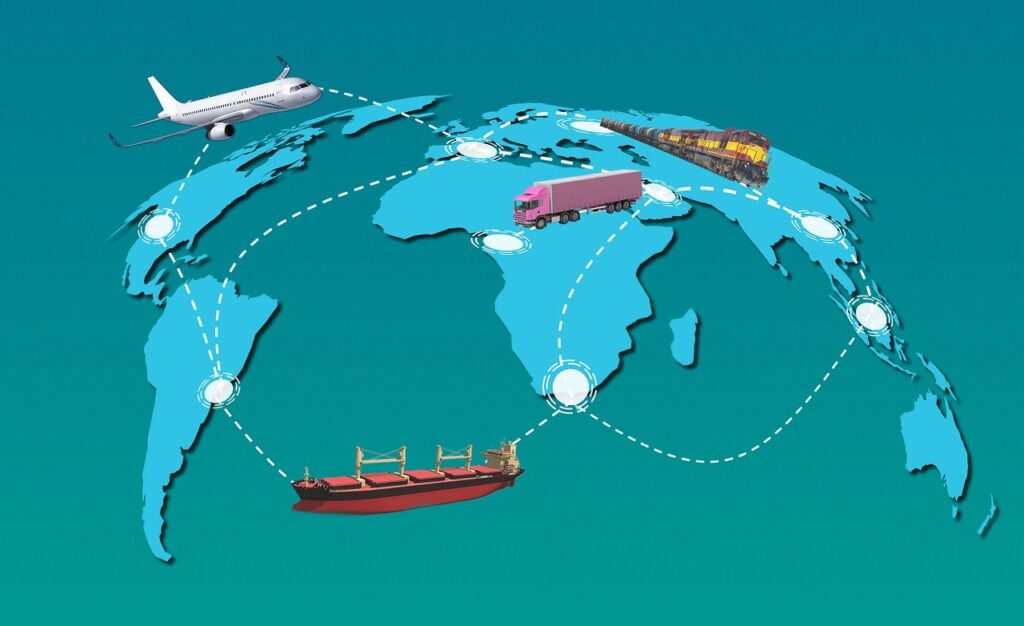Disclosure:
Some of the links on this website are affiliate links, which means that if you click on one of the links and sign up or make a purchase, we may earn a small commission at no additional cost to you. This commission helps support the maintenance and operation of this site.
We only recommend products or services that we believe will provide value to our readers. Our opinions and recommendations are based on our own research and experiences, and we strive to offer honest and unbiased content.
Please note that your support through these affiliate links is greatly appreciated, as it helps us continue to provide quality content and resources.
Thank you for your support!
Key Areas of Focus for Aspiring Entrepreneurs and Business Professionals
Supply Chain Management (SCM) is a critical aspect of global business, encompassing the planning, coordination, and management of sourcing, production, transportation, and delivery of goods and services. In today’s interconnected world, supply chains often span multiple countries and regions, making their management both challenging and vital for a company’s success. Below is an in-depth look into the key components of SCM, tools you can use, and skills to develop for successful management.

Key Components of Supply Chain Management
- Procurement and Sourcing
- This involves selecting suppliers and purchasing materials or products needed to create your offerings. For global businesses, this often means sourcing materials from international vendors, which can result in cost savings but also adds complexity due to tariffs, trade agreements, and quality control.
- Production and Manufacturing
- The production phase includes transforming raw materials into finished goods. Manufacturing can occur in-house or be outsourced to other countries (offshoring). It’s essential to balance cost, quality, and production time while navigating potential regulatory hurdles and supply disruptions in global markets.
- Logistics and Transportation
- Logistics focuses on moving goods efficiently across borders, either from suppliers to manufacturing plants or from manufacturing sites to consumers. International transportation may involve sea, air, rail, or road and requires navigating customs, duties, and import/export regulations.
- Inventory Management
- Efficient inventory management ensures that you have the right amount of stock available at the right time, without incurring excessive storage costs or running the risk of stockouts. In a global context, this means accounting for longer lead times and unpredictable delays.
- Distribution and Warehousing
- Distribution involves ensuring that the products reach the end customer through various channels such as wholesalers, retailers, or directly to the consumer. Warehousing plays a key role in this process, especially when dealing with international markets that require regional storage facilities.
- Customer Service
- Managing customer expectations and resolving issues efficiently is a critical part of the supply chain, especially for global companies where logistics, shipping times, and cultural expectations can vary greatly across regions.
Tools and Platforms for Supply Chain Management
There are various software platforms and tools designed to streamline and optimize supply chain operations. Here are some commonly used ones:
- SAP Integrated Business Planning: An enterprise-grade tool for demand forecasting, inventory optimization, and managing the global supply chain.
- Oracle NetSuite: Offers real-time inventory management, global supply chain visibility, and seamless integration across all areas of business operations.
- IBM Sterling Supply Chain Suite: Uses AI and blockchain technology to provide visibility and transparency across the entire supply chain network, from sourcing to delivery.
- ShipBob: Designed for small businesses, this platform provides fulfillment solutions and allows businesses to track orders and inventory in real-time, optimizing logistics and last-mile delivery.
- Fishbowl Inventory: This inventory management tool integrates with QuickBooks and provides affordable supply chain solutions for small to mid-sized businesses.
Key Skills to Develop in Supply Chain Management
- Strategic Thinking
- You need to be able to anticipate and plan for changes in demand, supply chain disruptions, and the evolving trade regulations that impact global logistics.
- Negotiation Skills
- Working with suppliers, transportation providers, and distributors requires strong negotiation skills to ensure you get the best prices and terms while maintaining quality and reliability.
- Analytical and Data-Driven Decision-Making
- Supply chain management is data-intensive. You need to interpret data to forecast demand, manage inventory, optimize routes, and improve efficiencies across the supply chain.
- Risk Management
- Global supply chains are vulnerable to disruptions such as natural disasters, political unrest, and pandemics. Risk management skills help you develop contingency plans and mitigate potential losses.
- Cultural Awareness and Communication
- In international business, understanding different cultures, legal requirements, and languages will help you manage relationships with global suppliers and distributors.
- Technical Skills
- Knowledge of supply chain software and systems like ERP (Enterprise Resource Planning), CRM (Customer Relationship Management), and SCM platforms is crucial for efficiency and success in global supply chains.
Focusing Your Knowledge Base
To succeed in supply chain management, aspiring entrepreneurs and professionals should focus on:
- Global Logistics and Transportation: Learn about international freight forwarding, shipping regulations, and cross-border logistics.
- Trade Regulations and Compliance: Understanding the intricacies of international trade laws, import/export regulations, and customs is critical to ensuring smooth operations across borders.
- Sustainable Supply Chain Practices: As sustainability becomes more central to business strategies, professionals should be familiar with green logistics, ethical sourcing, and minimizing environmental impact.
- Technology and Automation: Familiarize yourself with how automation, AI, and IoT (Internet of Things) are revolutionizing supply chain operations, from smart warehouses to predictive maintenance.
Insights into Profits and Challenges
- Profits: Efficient supply chain management directly impacts profitability. By optimizing sourcing, reducing transportation costs, and streamlining inventory management, businesses can improve their margins. For global businesses, access to cheaper labor and materials in other countries can provide additional savings.
- Challenges: However, managing a global supply chain comes with risks such as geopolitical instability, fluctuating tariffs, and currency exchange rates. Additionally, longer transportation times and the potential for supply chain disruptions (e.g., pandemics or natural disasters) can erode profits if not managed effectively.
Supply chain management is a multifaceted discipline that requires a strategic and analytical approach to succeed in global business. By focusing on key components like procurement, logistics, and customer service, while utilizing the right tools and skills, businesses can streamline their operations and gain a competitive advantage in international markets.
FAQ: Supply Chain Management
1. What is supply chain management (SCM)?
Supply Chain Management (SCM) is the process of overseeing and managing the flow of goods and services from sourcing materials to delivering the final product to customers. It includes procurement, production, logistics, inventory management, warehousing, and customer service.
2. What are the key components of supply chain management?
- Procurement and Sourcing: Selecting suppliers and purchasing raw materials or products.
- Production and Manufacturing: Transforming raw materials into finished products.
- Logistics and Transportation: Managing the movement of goods across borders.
- Inventory Management: Ensuring the right amount of stock is available at the right time.
- Distribution and Warehousing: Delivering products to customers and managing regional storage.
- Customer Service: Managing customer expectations and resolving issues related to the supply chain.
3. What tools can I use for supply chain management?
- SAP Integrated Business Planning: Ideal for demand forecasting and inventory optimization.
- Oracle NetSuite: Provides real-time inventory management and global supply chain visibility.
- IBM Sterling Supply Chain Suite: Uses AI and blockchain to provide visibility across the supply chain.
- ShipBob: Best for small businesses to track orders and manage fulfillment.
- Fishbowl Inventory: Integrates with QuickBooks for small to mid-sized business inventory solutions.
4. What are the essential skills needed in supply chain management?
- Strategic Thinking: Anticipating changes and planning accordingly.
- Negotiation Skills: Working with suppliers and logistics providers to secure favorable terms.
- Data Analysis: Interpreting data to make informed decisions on forecasting and inventory.
- Risk Management: Preparing for and mitigating disruptions.
- Cultural Awareness: Navigating cultural and legal differences in global supply chains.
- Technical Skills: Familiarity with supply chain software like ERP and CRM systems.
5. How does effective supply chain management affect profitability?
Efficient supply chain management can reduce costs related to procurement, transportation, and inventory. By optimizing these operations, businesses can lower expenses and improve profit margins. Global supply chains offer opportunities for cost savings by accessing lower-cost labor and materials, but they also come with risks such as longer lead times and potential disruptions.
6. What challenges are common in global supply chain management?
- Geopolitical Risks: Changes in tariffs, trade regulations, or political instability can disrupt supply chains.
- Transportation Delays: Longer lead times for international shipping can create challenges in meeting customer demand.
- Currency Exchange Rates: Fluctuating currency rates can affect costs when sourcing materials globally.
- Disruptions: Natural disasters, pandemics, and other unforeseen events can severely impact supply chains.
7. How does sustainability fit into supply chain management?
Sustainability in supply chain management involves reducing environmental impact through green logistics, ethical sourcing, and adopting sustainable business models. Businesses increasingly focus on minimizing carbon footprints and using eco-friendly transportation methods as part of their global operations.
8. What are some key focus areas for someone learning about supply chain management?
- Global Logistics and Transportation: Understanding freight forwarding and international shipping.
- Trade Regulations and Compliance: Learning about import/export laws and customs requirements.
- Technology and Automation: Leveraging AI, IoT, and blockchain to enhance supply chain efficiency.
- Risk Mitigation: Developing strategies to manage potential disruptions.
9. How can small businesses manage supply chains effectively?
Small businesses can use tools like ShipBob for fulfillment, Fishbowl Inventory for inventory management, and QuickBooks for financial integration. By focusing on efficiency, outsourcing when necessary, and choosing reliable partners, small businesses can compete globally while managing their supply chains cost-effectively.
10. How do I get started in supply chain management?
Start by familiarizing yourself with basic concepts of procurement, logistics, and inventory management. Use software tools like SAP or Fishbowl to manage operations, and develop critical skills such as data analysis, negotiation, and risk management.
More on Business here.
Subscribe to our Newsletter for Posts, Updates and More.





Leave a Reply